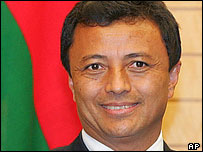Madagascar is the
world's fourth biggest island after Greenland, New Guinea and
Borneo. Because of its isolation most of its mammals, half its
birds, and most of its plants exist nowhere else on earth.
The island is heavily exposed to tropical cyclones which bring
torrential rains and destructive floods, such as the ones in 2000
and 2004, which left thousands homeless.
The Malagasy are thought to be descendents of Africans and
Indonesians who settled on the island more than 2,000 years ago.
Malagasy pay a lot of attention to their dead and spend much effort
on ancestral tombs, which are opened from time to time so the
remains can be carried in procession, before being rewrapped in
fresh shrouds.
 |
AT-A-GLANCE
Politics: President Ravalomanana is to
stand for re-election in December 2006. He took office in 2002
after a six-month power struggle with his rival Didier
Ratsiraka, who refused to relinquish the presidency after
disputed polls
Economy: Many areas suffer food
shortages. Madagascar is to benefit from a G8 commitment to
write off debts of 18 poor countries
International: Plans by Rio Tinto to
start coastal strip mining in the south-east has drawn the
attention of environmentalists
|
After sometimes
harsh French colonial rule, which included the bloody suppression of
an uprising in 1947, Madagascar gained independence in 1960. The
military seized power in the early 1970s with the aim of achieving a
socialist paradise.
This did not materialise. The economy went into decline and by
1982 the authorities were forced to adopt a structural adjustment
programme imposed by the International Monetary Fund.
The World Bank has estimated that 70% of Malagasy live on less
than $1 per day. Poverty and the competition for agricultural land
have put pressure on the island's dwindling forests, home to much of
Madagascar's unique wildlife and key to its emerging tourist
industry.
The island has strong ties with France as well as economic and
cultural links with French-speaking West Africa.
- Full name: Republic of Madagascar
- Population: 18.4 million (UN, 2005)
- Capital: Antananarivo
- Area: 587,041 sq km (226,658 sq miles)
- Major languages: Malagasy (official), French
- Major religions: Indigenous beliefs, Christianity
- Life expectancy: 54 years (men), 57 years (women) (UN)
- Monetary unit: Ariary
- Main exports: Vanilla, coffee, seafood, cloves,
petroleum products, chromium, fabrics
- GNI per capita: US $290 (World Bank, 2006)
- Internet domain: .mg
- International dialling code: +261
President: Marc Ravalomanana
Millionaire businessman Marc Ravalomanana has pursued free-market
reforms which have been welcomed by donors and investors. Aid has
increased and foreign debt has been cancelled. But poverty remains
endemic and protesters have taken to the streets over rising prices.

President Marc Ravalomanana, a free-market
reformer |
When Mr
Ravalomanana claimed victory in presidential elections in December
2001 a bitter six-month struggle for power with his predecessor,
veteran leader Didier Ratsiraka, ensued.
After the US and France recognised Mr Ravalomanana as the
legitimate leader, Didier Ratsiraka flew to France and his forces on
the island switched sides.
Mr Ravalomanana promised to tackle poverty and unemployment, but
he inherited an economy which was suffering after months of economic
disruption and political violence.
Marc Ravalomanana was born in the village of Imerikasina, near
Antananarivo. In true rags-to-riches fashion, he began his working
life selling home-made yogurt off the back of a bicycle.
His dairy and oil products business is now the largest
non-foreign-owned company on the island.
He took to the political stage in 1999 and gained a huge
following in Antananarivo. As mayor of the capital he was credited
with instigating a major clean-up of the city.
Prime minister: Jacques Sylla
Foreign minister: Marcel Ranjeva
Finance minister: Radavidson Andriamparany
National state radio and TV came under the control of
presidential contender Marc Ravalomanana in March 2002 during the
power struggle with veteran leader Didier Ratsiraka.
Mr Ravalomanana also owns the private Malagasy Broadcasting
System, which operates the MBS TV and Radio MBS networks. Many
private radio stations in the capital are owned by pro-Ravalomanana
politicians.
A boom in privately-owned FM radio stations and more critical
political reporting by the print media followed 1990's law on press
freedom.
Although nationwide radio and TV broadcasting remain the monopoly
of the state, there are hundreds of private local radio and TV
stations.
The press
Midi-Madagasikara-
privately-owned Antananarivo daily
Madagascar-Tribune
- privately-owned Antananarivo daily
L'Express -
privately-owned Antananarivo daily
La Gazette de la Grande
Ile - Antananarivo daily
Lakroa (Cross) - Roman Catholic weekly
Dans Les Media Demain -
privately-owned, Antananarivo weekly
Feon'ny Merina (Voice of the Merina) - privately-owned weekly
for Merina people of Malay origin
Jureco - privately-owned, monthly
Revue de l'Ocean Indien - privately-owned, monthly, also
covering other Indian Ocean islands
Television
Television Malagasy (TVM) - state-owned
Radio-Television Analamanga
(RTA) - privately-run, Antananarivo
Madagascar TV (MATV) -
privately-run, Antananarivo
MBS TV - commercial, owned by
Ravalomanana
Radio
Malagasy National Radio (RNM) - state-owned
Radio Don Bosco -
Roman Catholic FM station in capital
Radio MBS - commercial network
owned by Ravalomanana
Radio Feon'ny Merina - privately-owned, Antananarivo, promotes
interests of Merina people of Malay origin
Radio Tsioka Vao - privately-owned, Antananarivo
Radio Lazan' Iarivo (RLI) (Glory of Iarivo) - privately-owned
Radio Korail - privately-owned, Antananarivo
Radio Antsiva -
privately-owned, Antananarivo 

.gif)